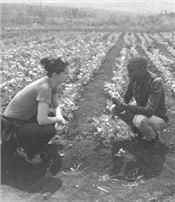|
Soybean Innovation Lab Is Connecting People Around The Globe With New, Free Online Course

Online integrated pest management course creator and SIL extension lead Nicole Lee, pictured with Nelito Rosario, agronomic technician for IITA in Mozambique.
URBANA, ILL.
Soybean Innovation Lab (SIL) recently launched Africa’s first free, open-access, certificate-based online course in integrated pest management (IPM) and pesticide safety.
Insect pests, weeds, and diseases are common problems for farmers worldwide. In sub-Saharan Africa, pest control is typically manual, which is labor-intensive and often ineffective.
Additional pest management practices, including crop diversification, timely planting, and judicious use of pesticides is crucial for cost-effective pest control. For newer, more input-intensive commercials crops, such as soy, an understanding of IPM practices, including safe pesticide use, is critical not only for increasing soybean production but also for reducing environmental and human health risks.
Before SIL’s new digital course, comprehensive information on IPM was not readily available in many parts of Africa.
Laure Lysette Chimi Nkombo, assistant research officer with the Institute of Agricultural Research for Development (IRAD) in Cameroon, is an IPM course graduate. “I liked the different modules because they were detailed and well-structured. I particularly liked the insect pest management module. It is a big issue for many farmers in Africa,” she says.
The objective of the course is to equip extension agents and other practitioners, such as those working in the private sector or in development agencies, with the skills needed to successfully implement an IPM system. That’s what Nkombo intends to do. “I plan to put my knowledge from the online course into practice. After, I will share this knowledge with the students and farmers I work with,” she says.
The course aims to provide learners with a better understanding of safe pesticide application and storage. Throughout the course, students are able to engage and network with each other via surveys and a discussion board, and they can test their knowledge with assessments at the end of each module. Upon successful completion of the course, students receive a personalized, downloadable certificate.
The course has been very educational, comprehensive and reliable,” says IPM student and certificate-recipient Muhammad Abubakar, an agricultural engineering and farm machinery consultant and business director for Hamdan Agro, Machines & Energy in northern Nigeria.
“We [Hamdan Agro, Machines & Energy] have been training farmers on Post-Harvest Management Technology in northern Nigeria. Nigeria records 50% post-harvest losses recently. IPM plays a vital role in post-harvest management technology,” he adds.
Since the course launch in August 2019, SIL has reached almost 400 new learners in 31 countries around the globe and awarded over 60 certificates. The course is currently available in English. A Portuguese translation is underway, and a French version of the course will be released later.
The online course was developed by Nicole Lee, a graduate researcher and extension lead for the Soybean Innovation Lab at the University of Illinois. She is currently pursuing a Ph.D. in Crop Sciences at U of I. “Providing extension workers and researchers with a platform for learning about and discussing important agricultural practices is key for disseminating the latest knowledge to farmers,” she says. “The intention behind this course was to fill a crucial training gap, particularly in regards to pesticide safety, while creating a network for practitioners interested in integrated pest management to discuss their successes and challenges with pest management in their home countries.”
The Soybean Innovation Lab is hosted in the College of Agricultural, Consumer and Environmental Sciences at the University of Illinois. ∆
|
|